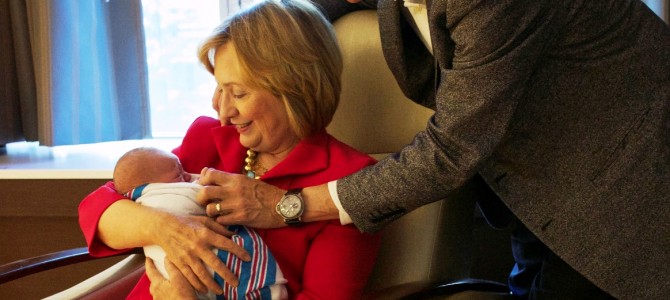
Somebody ran a headline about the “U.S. royal baby” when Bill Clinton slipped and mentioned his grandchild might arrive by the end of the month and when Hillary Clinton was on her will-she-or-won’t-she-run tour mentioning—often, apparently—that she’s been thinking about family policies as she is on grandmother watch.
The Clintons-as-U.S.-royalty idea isn’t new. I heard a bunch of it from non-Americans and Americans alike when we lived in London back when Chelsea Clinton was getting married. Royal thinking was in the air with growing speculation about an engagement of Prince William and Katherine Middleton.
The whole analogy struck me as odd. First, the description was always reserved for Hillary and Bill Clinton and their only daughter as the political descendants of the Kennedys. Jenna Bush, daughter of former presidents George W. Bush and granddaughter of George H. W. Bush, got married about the same time, but didn’t get the same publicity. This is partially because her family was no longer in the spotlight and she didn’t seek the publicity, but there wasn’t an effort to impose the royal title upon her, even though by sheer numbers and political participation the Bushes are far more like the Kennedy dynasty than the Clintons. Second, the term “royalty” was meant as a compliment. That made some sense from the British point of view, which still sees royals as respected figureheads. But coming from Americans, who resist the idea of hereditary power, the positive connotation for “royalty” made little sense.
All the wires got crossed. British Tories, who are most closely analogous to compassionate conservatism of George W. Bush, viewed the Clintons as most revered, and U.S. liberals, who are usually focused on egalitarian arguments, casually used a very inegalitarian term to favorably describe the Clintons.
And now with Chelsea’s pregnancy and recent delivery of a baby girl, Charlotte (lovely name, by the way), some are trying to make the U.S. royalty shtick stick. Unfortunately for Chelsea, I fear the labelers might be right in a very significant way—she is likely to face a heightened level of scrutiny as the Duchess of Cambridge does.
Why We Scrutinize Mothers in the Spotlight
Usually the media presents the Mommy Wars as a verbal knock-down-drag-out clash of working moms versus stay-at-home moms, or breastfeeders versus formula feeders, or homeschool versus private school, and so on. But the Mommy Wars aren’t cruel fights, they are crises of confidence.
Modern, Western, and educated women fight the Mommy Wars because we have neither necessity to constrain nor experience to inform our choices. Relatively wealthy and educated, we spend our 20s and 30s studying and practicing a profession. Yet we seldom prepare for motherhood before a positive pregnancy test. As soon as we learn we are pregnant we reach for books…about pregnancy and childbirth. It often takes months before we start to study for actual motherhood, again with books. Our motherhood prep is usually rushed and heavy on theory, light on practice. But babies are mostly practice. They throw out (and up) challenges that book learning can’t cover well.
Worse, when the baby comes, we are often alone, living away from family and family neighborhoods. The need for family and community doesn’t register until we need it and then we realize that we can’t conjure it up at our whim. We have to move, build, rebuild—it takes time and often money to get back connections that we once disregarded, and that after we finally recognize our problem. Isolated and used to relying on book learning—it worked so well for our law and accounting degrees!—we seek a unified theory of motherhood, a rule book, a formula. And we try to find that by looking around at what all the other new mommies are doing.
The Mommy Wars are really about seeking endorsement. We need other mothers to agree with us so we will “know” we are doing the right thing. Note that the battles rage hottest over visible things like breastfeeding or baby-wearing. It has to be that way. How else would moms “vote”?
This motherhood-by-majority-rule puts quite a pressure burden on high-profile mothers. Anything that they do is seen not only as judgment against mothers who do things another way—they point big avocados—but also as social pressure to lure away mothers from those other ways. For mothers of another mind, this “attack” cannot stand. The famous mom can’t just be disagreed with, she must be discredited.
Chelsea, the Supposed Everywoman in the Spotlight
The more Hillary touts her grandmother status, the higher Chelsea’s profile and the more scrutiny she will endure. Worse for Chelsea, interest in the Duchess of Cambridge has an air of “Lifestyles of the Rich and Famous.” Her role is to be Other, a representative of a very unordinary family of symbolic power. Even then, the “too skinny” shouldn’t-be-having-another-
So, for example, Katherine, the Duchess of Cambridge, will face less criticism for hiring a nanny than Chelsea, All-American girl, will, even though with the public expectations placed on both women a nanny is a necessity for each of them. (More for Chelsea as it is doubtful Hillary Clinton would be the “granny-nanny” as Carole Middleton was in Prince George’s early days.)
It is an untenable position for Chelsea. She is about to be thrust into the spotlight anew and far more vulnerable than she’s ever been. People watch her because she is special, her mother’s daughter, but they want to see her as normal. She probably is. She’s just another one of the unsure, professionally trained mothers desperate to do the best for her child. This time the spotlight might be harder to accept.









